Assessing Free Market's Influence on the Fourth Estate Function
VerifiedAdded on 2022/07/20
|14
|4502
|21
Essay
AI Summary
This essay critically assesses the extent to which the free market imposes itself on the fourth estate function of the press, focusing on the impact of competition, ownership, and external forces on journalistic integrity. It examines how media companies compete for advertisers and consumers, leading to changes in content and reporting. The essay discusses the influence of government interference, social media, and the challenges faced by the press in maintaining its role as a guardian of public record, using examples like Donald Trump and Fox News. It highlights the importance of trust and the ability of media outlets like The Guardian to thrive by upholding their fourth estate mandate while navigating a competitive market. The essay concludes by emphasizing the need for the press to balance profitability with its responsibilities to society.
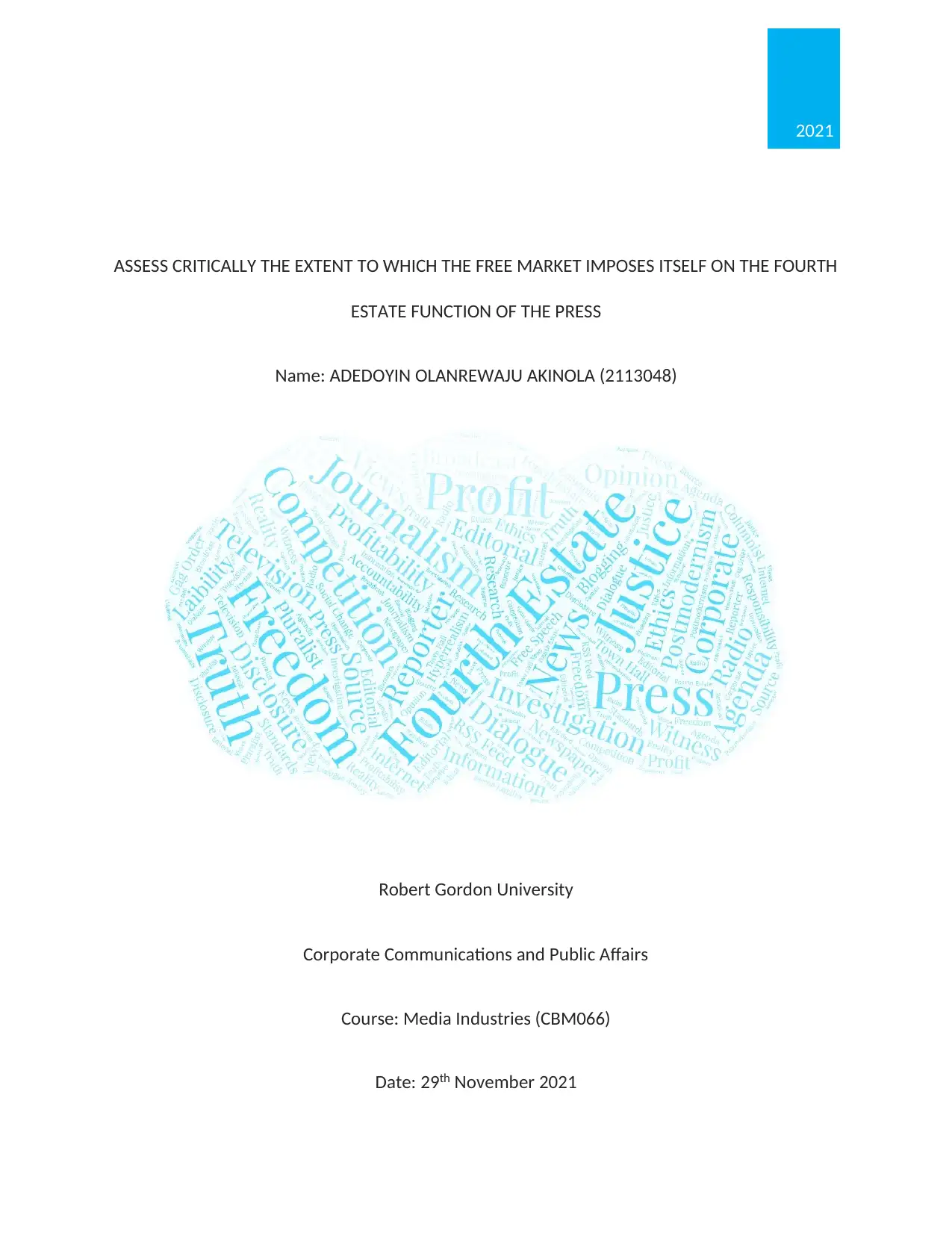
ASSESS CRITICALLY THE EXTENT TO WHICH THE FREE MARKET IMPOSES ITSELF ON THE FOURTH
ESTATE FUNCTION OF THE PRESS
Name: ADEDOYIN OLANREWAJU AKINOLA (2113048)
Robert Gordon University
Corporate Communications and Public Affairs
Course: Media Industries (CBM066)
Date: 29th November 2021
2021
ESTATE FUNCTION OF THE PRESS
Name: ADEDOYIN OLANREWAJU AKINOLA (2113048)
Robert Gordon University
Corporate Communications and Public Affairs
Course: Media Industries (CBM066)
Date: 29th November 2021
2021
Paraphrase This Document
Need a fresh take? Get an instant paraphrase of this document with our AI Paraphraser
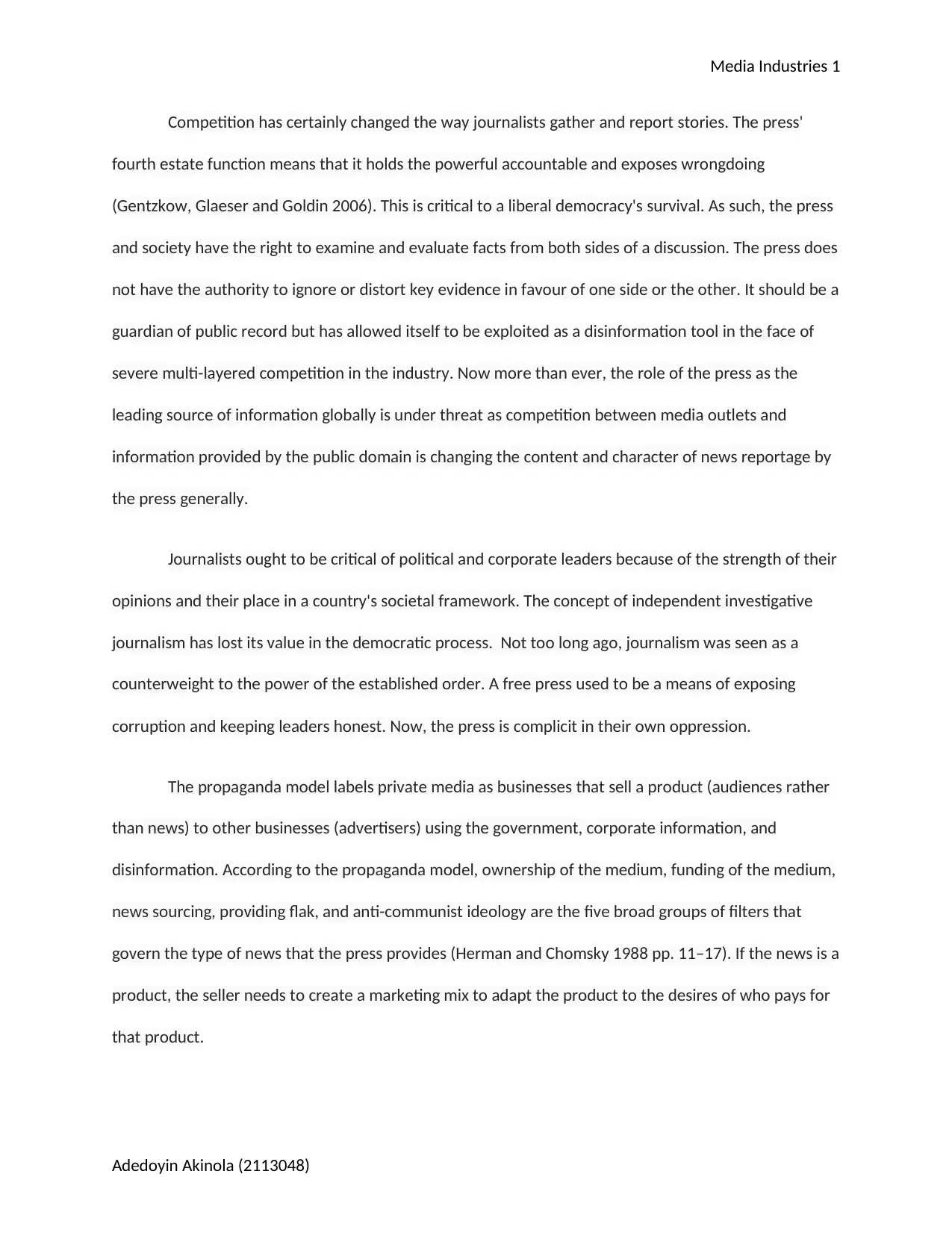
Media Industries 1
Adedoyin Akinola (2113048)
Competition has certainly changed the way journalists gather and report stories. The press'
fourth estate function means that it holds the powerful accountable and exposes wrongdoing
(Gentzkow, Glaeser and Goldin 2006). This is critical to a liberal democracy's survival. As such, the press
and society have the right to examine and evaluate facts from both sides of a discussion. The press does
not have the authority to ignore or distort key evidence in favour of one side or the other. It should be a
guardian of public record but has allowed itself to be exploited as a disinformation tool in the face of
severe multi-layered competition in the industry. Now more than ever, the role of the press as the
leading source of information globally is under threat as competition between media outlets and
information provided by the public domain is changing the content and character of news reportage by
the press generally.
Journalists ought to be critical of political and corporate leaders because of the strength of their
opinions and their place in a country's societal framework. The concept of independent investigative
journalism has lost its value in the democratic process. Not too long ago, journalism was seen as a
counterweight to the power of the established order. A free press used to be a means of exposing
corruption and keeping leaders honest. Now, the press is complicit in their own oppression.
The propaganda model labels private media as businesses that sell a product (audiences rather
than news) to other businesses (advertisers) using the government, corporate information, and
disinformation. According to the propaganda model, ownership of the medium, funding of the medium,
news sourcing, providing flak, and anti-communist ideology are the five broad groups of filters that
govern the type of news that the press provides (Herman and Chomsky 1988 pp. 11–17). If the news is a
product, the seller needs to create a marketing mix to adapt the product to the desires of who pays for
that product.
Adedoyin Akinola (2113048)
Competition has certainly changed the way journalists gather and report stories. The press'
fourth estate function means that it holds the powerful accountable and exposes wrongdoing
(Gentzkow, Glaeser and Goldin 2006). This is critical to a liberal democracy's survival. As such, the press
and society have the right to examine and evaluate facts from both sides of a discussion. The press does
not have the authority to ignore or distort key evidence in favour of one side or the other. It should be a
guardian of public record but has allowed itself to be exploited as a disinformation tool in the face of
severe multi-layered competition in the industry. Now more than ever, the role of the press as the
leading source of information globally is under threat as competition between media outlets and
information provided by the public domain is changing the content and character of news reportage by
the press generally.
Journalists ought to be critical of political and corporate leaders because of the strength of their
opinions and their place in a country's societal framework. The concept of independent investigative
journalism has lost its value in the democratic process. Not too long ago, journalism was seen as a
counterweight to the power of the established order. A free press used to be a means of exposing
corruption and keeping leaders honest. Now, the press is complicit in their own oppression.
The propaganda model labels private media as businesses that sell a product (audiences rather
than news) to other businesses (advertisers) using the government, corporate information, and
disinformation. According to the propaganda model, ownership of the medium, funding of the medium,
news sourcing, providing flak, and anti-communist ideology are the five broad groups of filters that
govern the type of news that the press provides (Herman and Chomsky 1988 pp. 11–17). If the news is a
product, the seller needs to create a marketing mix to adapt the product to the desires of who pays for
that product.
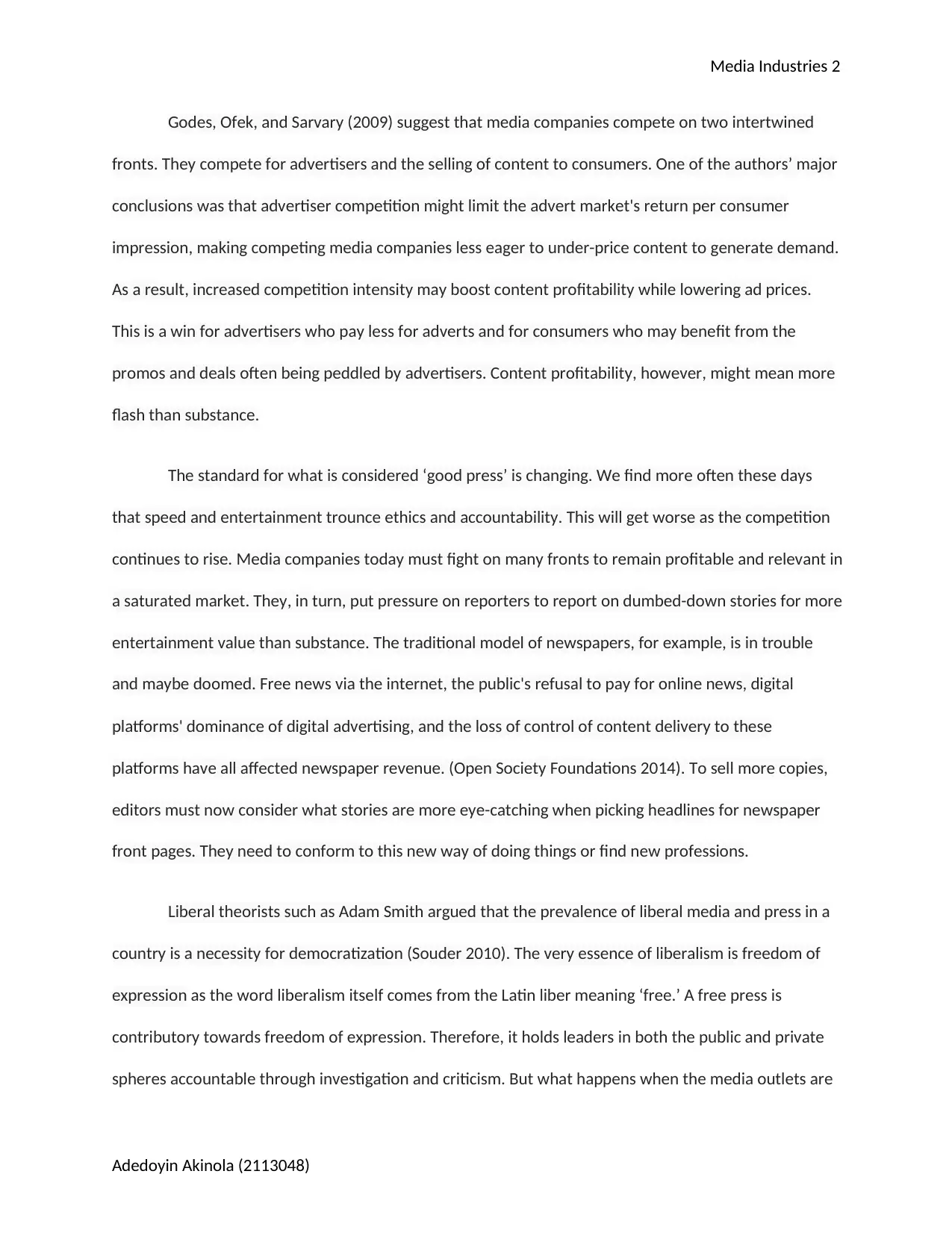
Media Industries 2
Adedoyin Akinola (2113048)
Godes, Ofek, and Sarvary (2009) suggest that media companies compete on two intertwined
fronts. They compete for advertisers and the selling of content to consumers. One of the authors’ major
conclusions was that advertiser competition might limit the advert market's return per consumer
impression, making competing media companies less eager to under-price content to generate demand.
As a result, increased competition intensity may boost content profitability while lowering ad prices.
This is a win for advertisers who pay less for adverts and for consumers who may benefit from the
promos and deals often being peddled by advertisers. Content profitability, however, might mean more
flash than substance.
The standard for what is considered ‘good press’ is changing. We find more often these days
that speed and entertainment trounce ethics and accountability. This will get worse as the competition
continues to rise. Media companies today must fight on many fronts to remain profitable and relevant in
a saturated market. They, in turn, put pressure on reporters to report on dumbed-down stories for more
entertainment value than substance. The traditional model of newspapers, for example, is in trouble
and maybe doomed. Free news via the internet, the public's refusal to pay for online news, digital
platforms' dominance of digital advertising, and the loss of control of content delivery to these
platforms have all affected newspaper revenue. (Open Society Foundations 2014). To sell more copies,
editors must now consider what stories are more eye-catching when picking headlines for newspaper
front pages. They need to conform to this new way of doing things or find new professions.
Liberal theorists such as Adam Smith argued that the prevalence of liberal media and press in a
country is a necessity for democratization (Souder 2010). The very essence of liberalism is freedom of
expression as the word liberalism itself comes from the Latin liber meaning ‘free.’ A free press is
contributory towards freedom of expression. Therefore, it holds leaders in both the public and private
spheres accountable through investigation and criticism. But what happens when the media outlets are
Adedoyin Akinola (2113048)
Godes, Ofek, and Sarvary (2009) suggest that media companies compete on two intertwined
fronts. They compete for advertisers and the selling of content to consumers. One of the authors’ major
conclusions was that advertiser competition might limit the advert market's return per consumer
impression, making competing media companies less eager to under-price content to generate demand.
As a result, increased competition intensity may boost content profitability while lowering ad prices.
This is a win for advertisers who pay less for adverts and for consumers who may benefit from the
promos and deals often being peddled by advertisers. Content profitability, however, might mean more
flash than substance.
The standard for what is considered ‘good press’ is changing. We find more often these days
that speed and entertainment trounce ethics and accountability. This will get worse as the competition
continues to rise. Media companies today must fight on many fronts to remain profitable and relevant in
a saturated market. They, in turn, put pressure on reporters to report on dumbed-down stories for more
entertainment value than substance. The traditional model of newspapers, for example, is in trouble
and maybe doomed. Free news via the internet, the public's refusal to pay for online news, digital
platforms' dominance of digital advertising, and the loss of control of content delivery to these
platforms have all affected newspaper revenue. (Open Society Foundations 2014). To sell more copies,
editors must now consider what stories are more eye-catching when picking headlines for newspaper
front pages. They need to conform to this new way of doing things or find new professions.
Liberal theorists such as Adam Smith argued that the prevalence of liberal media and press in a
country is a necessity for democratization (Souder 2010). The very essence of liberalism is freedom of
expression as the word liberalism itself comes from the Latin liber meaning ‘free.’ A free press is
contributory towards freedom of expression. Therefore, it holds leaders in both the public and private
spheres accountable through investigation and criticism. But what happens when the media outlets are
⊘ This is a preview!⊘
Do you want full access?
Subscribe today to unlock all pages.

Trusted by 1+ million students worldwide
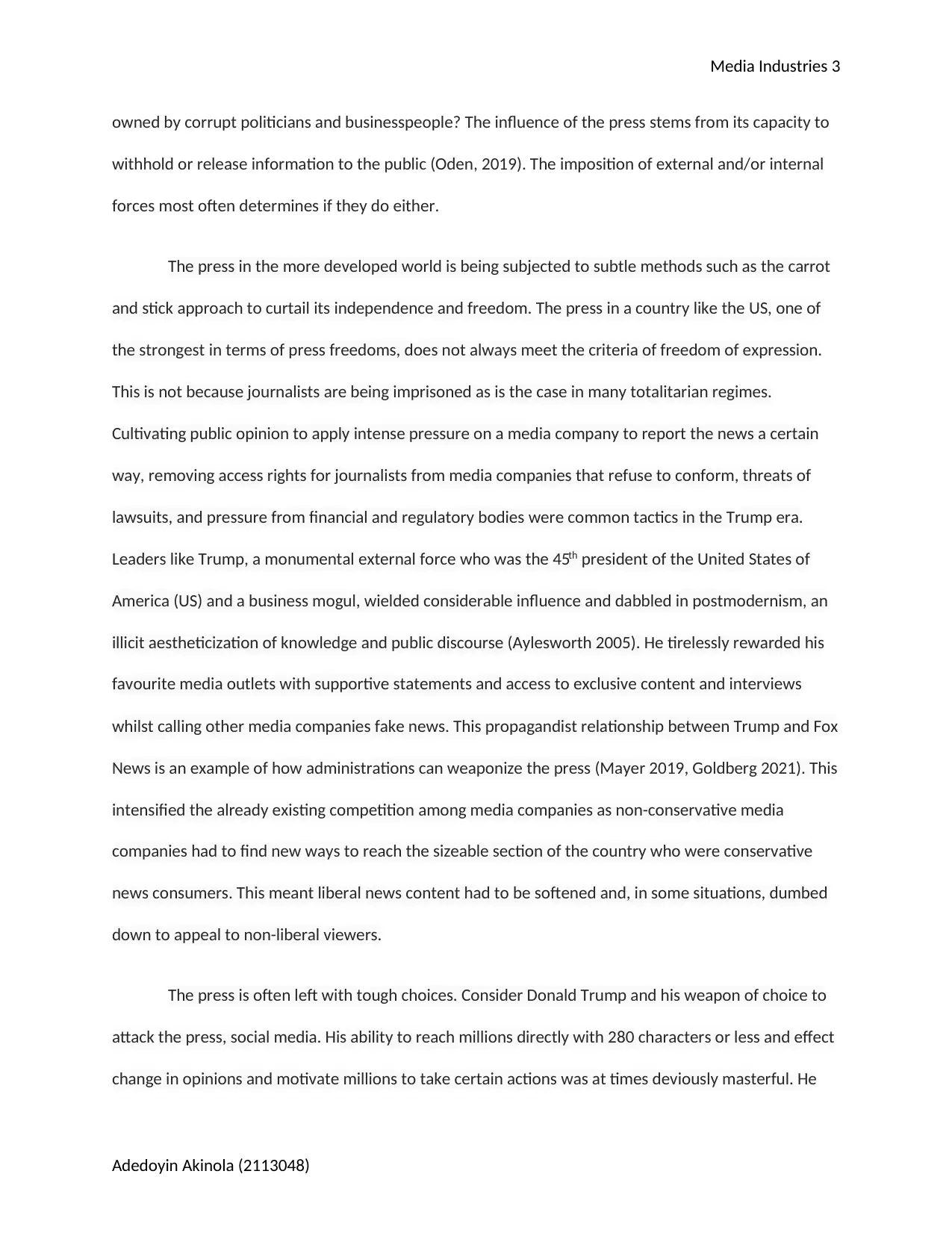
Media Industries 3
Adedoyin Akinola (2113048)
owned by corrupt politicians and businesspeople? The influence of the press stems from its capacity to
withhold or release information to the public (Oden, 2019). The imposition of external and/or internal
forces most often determines if they do either.
The press in the more developed world is being subjected to subtle methods such as the carrot
and stick approach to curtail its independence and freedom. The press in a country like the US, one of
the strongest in terms of press freedoms, does not always meet the criteria of freedom of expression.
This is not because journalists are being imprisoned as is the case in many totalitarian regimes.
Cultivating public opinion to apply intense pressure on a media company to report the news a certain
way, removing access rights for journalists from media companies that refuse to conform, threats of
lawsuits, and pressure from financial and regulatory bodies were common tactics in the Trump era.
Leaders like Trump, a monumental external force who was the 45th president of the United States of
America (US) and a business mogul, wielded considerable influence and dabbled in postmodernism, an
illicit aestheticization of knowledge and public discourse (Aylesworth 2005). He tirelessly rewarded his
favourite media outlets with supportive statements and access to exclusive content and interviews
whilst calling other media companies fake news. This propagandist relationship between Trump and Fox
News is an example of how administrations can weaponize the press (Mayer 2019, Goldberg 2021). This
intensified the already existing competition among media companies as non-conservative media
companies had to find new ways to reach the sizeable section of the country who were conservative
news consumers. This meant liberal news content had to be softened and, in some situations, dumbed
down to appeal to non-liberal viewers.
The press is often left with tough choices. Consider Donald Trump and his weapon of choice to
attack the press, social media. His ability to reach millions directly with 280 characters or less and effect
change in opinions and motivate millions to take certain actions was at times deviously masterful. He
Adedoyin Akinola (2113048)
owned by corrupt politicians and businesspeople? The influence of the press stems from its capacity to
withhold or release information to the public (Oden, 2019). The imposition of external and/or internal
forces most often determines if they do either.
The press in the more developed world is being subjected to subtle methods such as the carrot
and stick approach to curtail its independence and freedom. The press in a country like the US, one of
the strongest in terms of press freedoms, does not always meet the criteria of freedom of expression.
This is not because journalists are being imprisoned as is the case in many totalitarian regimes.
Cultivating public opinion to apply intense pressure on a media company to report the news a certain
way, removing access rights for journalists from media companies that refuse to conform, threats of
lawsuits, and pressure from financial and regulatory bodies were common tactics in the Trump era.
Leaders like Trump, a monumental external force who was the 45th president of the United States of
America (US) and a business mogul, wielded considerable influence and dabbled in postmodernism, an
illicit aestheticization of knowledge and public discourse (Aylesworth 2005). He tirelessly rewarded his
favourite media outlets with supportive statements and access to exclusive content and interviews
whilst calling other media companies fake news. This propagandist relationship between Trump and Fox
News is an example of how administrations can weaponize the press (Mayer 2019, Goldberg 2021). This
intensified the already existing competition among media companies as non-conservative media
companies had to find new ways to reach the sizeable section of the country who were conservative
news consumers. This meant liberal news content had to be softened and, in some situations, dumbed
down to appeal to non-liberal viewers.
The press is often left with tough choices. Consider Donald Trump and his weapon of choice to
attack the press, social media. His ability to reach millions directly with 280 characters or less and effect
change in opinions and motivate millions to take certain actions was at times deviously masterful. He
Paraphrase This Document
Need a fresh take? Get an instant paraphrase of this document with our AI Paraphraser
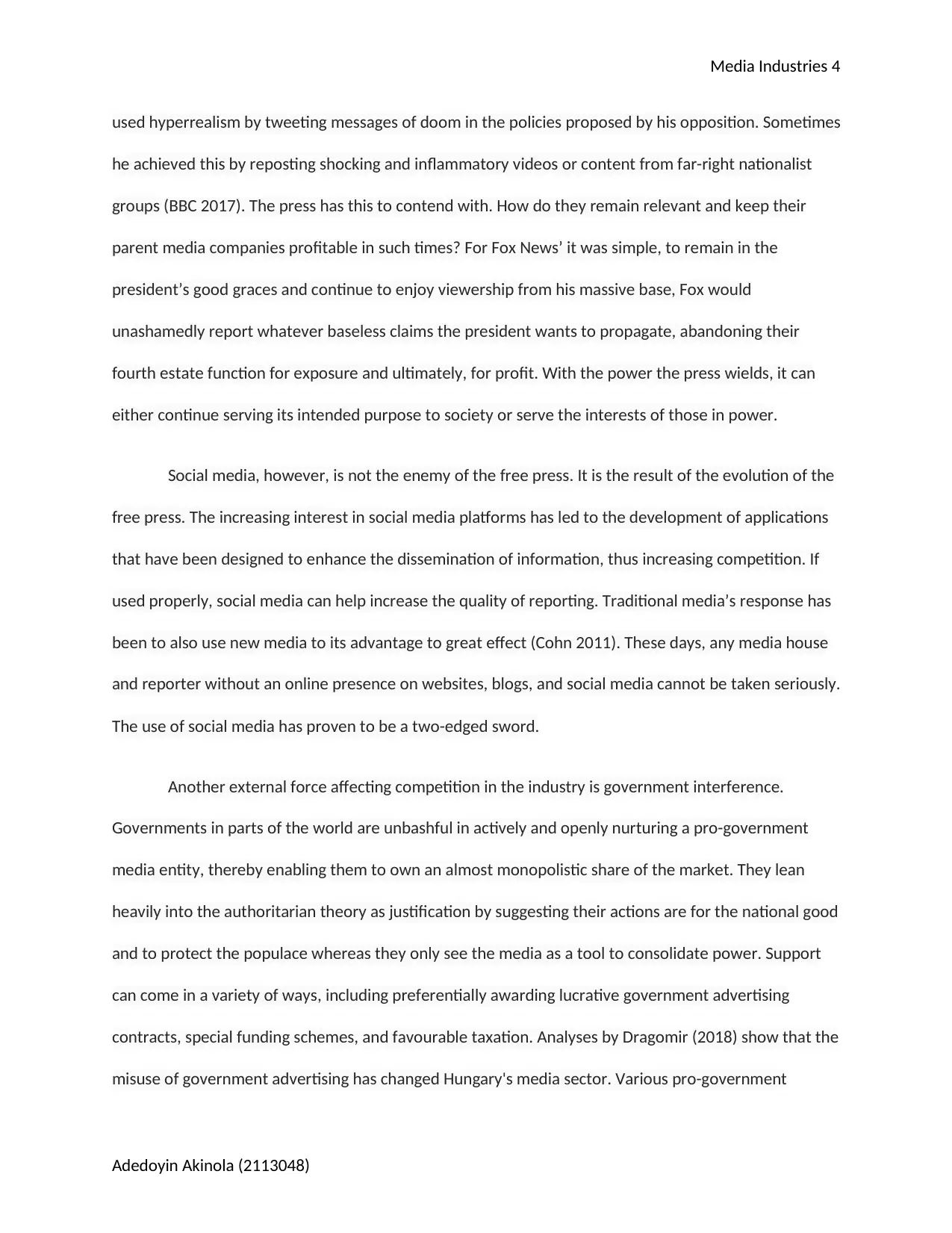
Media Industries 4
Adedoyin Akinola (2113048)
used hyperrealism by tweeting messages of doom in the policies proposed by his opposition. Sometimes
he achieved this by reposting shocking and inflammatory videos or content from far-right nationalist
groups (BBC 2017). The press has this to contend with. How do they remain relevant and keep their
parent media companies profitable in such times? For Fox News’ it was simple, to remain in the
president’s good graces and continue to enjoy viewership from his massive base, Fox would
unashamedly report whatever baseless claims the president wants to propagate, abandoning their
fourth estate function for exposure and ultimately, for profit. With the power the press wields, it can
either continue serving its intended purpose to society or serve the interests of those in power.
Social media, however, is not the enemy of the free press. It is the result of the evolution of the
free press. The increasing interest in social media platforms has led to the development of applications
that have been designed to enhance the dissemination of information, thus increasing competition. If
used properly, social media can help increase the quality of reporting. Traditional media’s response has
been to also use new media to its advantage to great effect (Cohn 2011). These days, any media house
and reporter without an online presence on websites, blogs, and social media cannot be taken seriously.
The use of social media has proven to be a two-edged sword.
Another external force affecting competition in the industry is government interference.
Governments in parts of the world are unbashful in actively and openly nurturing a pro-government
media entity, thereby enabling them to own an almost monopolistic share of the market. They lean
heavily into the authoritarian theory as justification by suggesting their actions are for the national good
and to protect the populace whereas they only see the media as a tool to consolidate power. Support
can come in a variety of ways, including preferentially awarding lucrative government advertising
contracts, special funding schemes, and favourable taxation. Analyses by Dragomir (2018) show that the
misuse of government advertising has changed Hungary's media sector. Various pro-government
Adedoyin Akinola (2113048)
used hyperrealism by tweeting messages of doom in the policies proposed by his opposition. Sometimes
he achieved this by reposting shocking and inflammatory videos or content from far-right nationalist
groups (BBC 2017). The press has this to contend with. How do they remain relevant and keep their
parent media companies profitable in such times? For Fox News’ it was simple, to remain in the
president’s good graces and continue to enjoy viewership from his massive base, Fox would
unashamedly report whatever baseless claims the president wants to propagate, abandoning their
fourth estate function for exposure and ultimately, for profit. With the power the press wields, it can
either continue serving its intended purpose to society or serve the interests of those in power.
Social media, however, is not the enemy of the free press. It is the result of the evolution of the
free press. The increasing interest in social media platforms has led to the development of applications
that have been designed to enhance the dissemination of information, thus increasing competition. If
used properly, social media can help increase the quality of reporting. Traditional media’s response has
been to also use new media to its advantage to great effect (Cohn 2011). These days, any media house
and reporter without an online presence on websites, blogs, and social media cannot be taken seriously.
The use of social media has proven to be a two-edged sword.
Another external force affecting competition in the industry is government interference.
Governments in parts of the world are unbashful in actively and openly nurturing a pro-government
media entity, thereby enabling them to own an almost monopolistic share of the market. They lean
heavily into the authoritarian theory as justification by suggesting their actions are for the national good
and to protect the populace whereas they only see the media as a tool to consolidate power. Support
can come in a variety of ways, including preferentially awarding lucrative government advertising
contracts, special funding schemes, and favourable taxation. Analyses by Dragomir (2018) show that the
misuse of government advertising has changed Hungary's media sector. Various pro-government
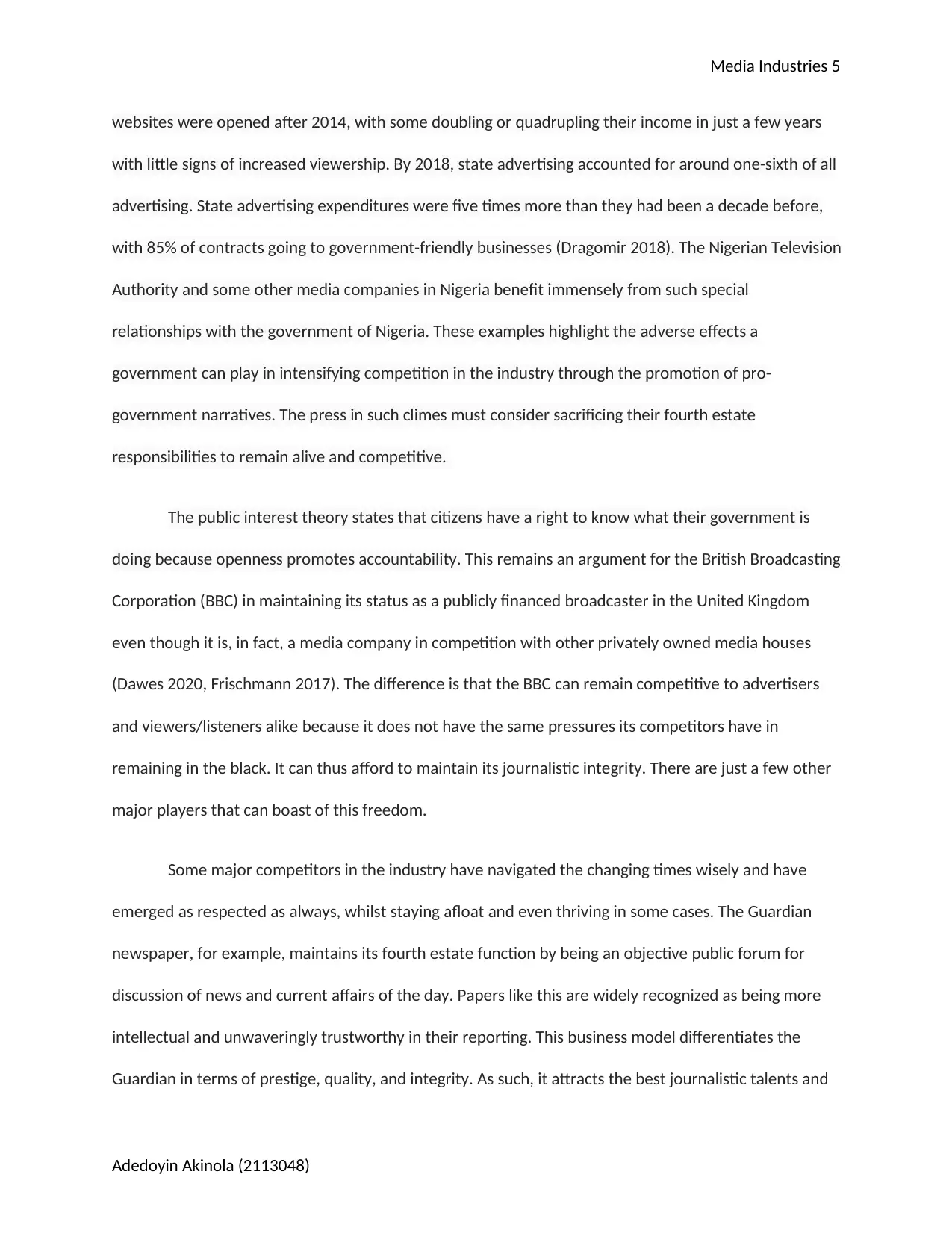
Media Industries 5
Adedoyin Akinola (2113048)
websites were opened after 2014, with some doubling or quadrupling their income in just a few years
with little signs of increased viewership. By 2018, state advertising accounted for around one-sixth of all
advertising. State advertising expenditures were five times more than they had been a decade before,
with 85% of contracts going to government-friendly businesses (Dragomir 2018). The Nigerian Television
Authority and some other media companies in Nigeria benefit immensely from such special
relationships with the government of Nigeria. These examples highlight the adverse effects a
government can play in intensifying competition in the industry through the promotion of pro-
government narratives. The press in such climes must consider sacrificing their fourth estate
responsibilities to remain alive and competitive.
The public interest theory states that citizens have a right to know what their government is
doing because openness promotes accountability. This remains an argument for the British Broadcasting
Corporation (BBC) in maintaining its status as a publicly financed broadcaster in the United Kingdom
even though it is, in fact, a media company in competition with other privately owned media houses
(Dawes 2020, Frischmann 2017). The difference is that the BBC can remain competitive to advertisers
and viewers/listeners alike because it does not have the same pressures its competitors have in
remaining in the black. It can thus afford to maintain its journalistic integrity. There are just a few other
major players that can boast of this freedom.
Some major competitors in the industry have navigated the changing times wisely and have
emerged as respected as always, whilst staying afloat and even thriving in some cases. The Guardian
newspaper, for example, maintains its fourth estate function by being an objective public forum for
discussion of news and current affairs of the day. Papers like this are widely recognized as being more
intellectual and unwaveringly trustworthy in their reporting. This business model differentiates the
Guardian in terms of prestige, quality, and integrity. As such, it attracts the best journalistic talents and
Adedoyin Akinola (2113048)
websites were opened after 2014, with some doubling or quadrupling their income in just a few years
with little signs of increased viewership. By 2018, state advertising accounted for around one-sixth of all
advertising. State advertising expenditures were five times more than they had been a decade before,
with 85% of contracts going to government-friendly businesses (Dragomir 2018). The Nigerian Television
Authority and some other media companies in Nigeria benefit immensely from such special
relationships with the government of Nigeria. These examples highlight the adverse effects a
government can play in intensifying competition in the industry through the promotion of pro-
government narratives. The press in such climes must consider sacrificing their fourth estate
responsibilities to remain alive and competitive.
The public interest theory states that citizens have a right to know what their government is
doing because openness promotes accountability. This remains an argument for the British Broadcasting
Corporation (BBC) in maintaining its status as a publicly financed broadcaster in the United Kingdom
even though it is, in fact, a media company in competition with other privately owned media houses
(Dawes 2020, Frischmann 2017). The difference is that the BBC can remain competitive to advertisers
and viewers/listeners alike because it does not have the same pressures its competitors have in
remaining in the black. It can thus afford to maintain its journalistic integrity. There are just a few other
major players that can boast of this freedom.
Some major competitors in the industry have navigated the changing times wisely and have
emerged as respected as always, whilst staying afloat and even thriving in some cases. The Guardian
newspaper, for example, maintains its fourth estate function by being an objective public forum for
discussion of news and current affairs of the day. Papers like this are widely recognized as being more
intellectual and unwaveringly trustworthy in their reporting. This business model differentiates the
Guardian in terms of prestige, quality, and integrity. As such, it attracts the best journalistic talents and
⊘ This is a preview!⊘
Do you want full access?
Subscribe today to unlock all pages.

Trusted by 1+ million students worldwide
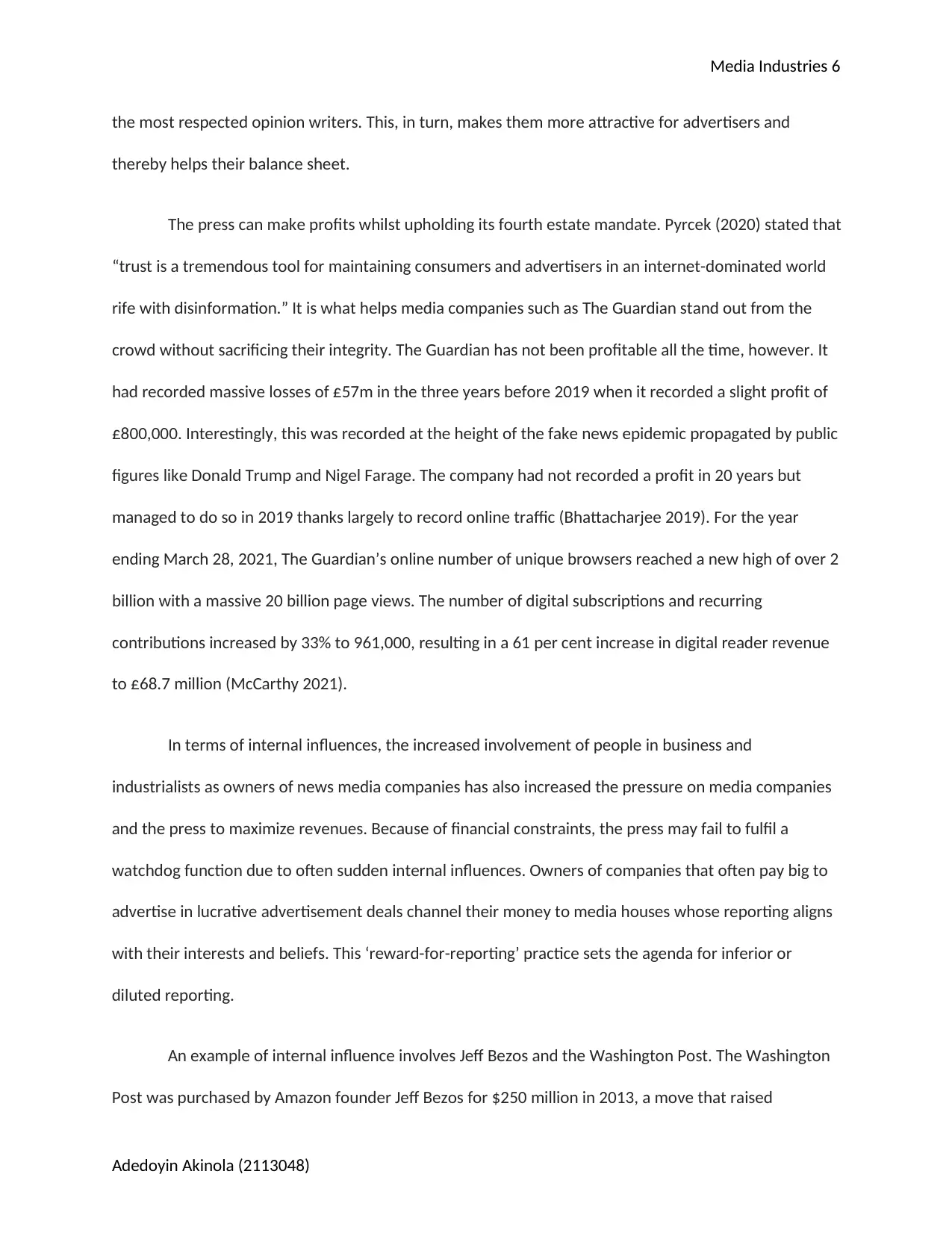
Media Industries 6
Adedoyin Akinola (2113048)
the most respected opinion writers. This, in turn, makes them more attractive for advertisers and
thereby helps their balance sheet.
The press can make profits whilst upholding its fourth estate mandate. Pyrcek (2020) stated that
“trust is a tremendous tool for maintaining consumers and advertisers in an internet-dominated world
rife with disinformation.” It is what helps media companies such as The Guardian stand out from the
crowd without sacrificing their integrity. The Guardian has not been profitable all the time, however. It
had recorded massive losses of £57m in the three years before 2019 when it recorded a slight profit of
£800,000. Interestingly, this was recorded at the height of the fake news epidemic propagated by public
figures like Donald Trump and Nigel Farage. The company had not recorded a profit in 20 years but
managed to do so in 2019 thanks largely to record online traffic (Bhattacharjee 2019). For the year
ending March 28, 2021, The Guardian’s online number of unique browsers reached a new high of over 2
billion with a massive 20 billion page views. The number of digital subscriptions and recurring
contributions increased by 33% to 961,000, resulting in a 61 per cent increase in digital reader revenue
to £68.7 million (McCarthy 2021).
In terms of internal influences, the increased involvement of people in business and
industrialists as owners of news media companies has also increased the pressure on media companies
and the press to maximize revenues. Because of financial constraints, the press may fail to fulfil a
watchdog function due to often sudden internal influences. Owners of companies that often pay big to
advertise in lucrative advertisement deals channel their money to media houses whose reporting aligns
with their interests and beliefs. This ‘reward-for-reporting’ practice sets the agenda for inferior or
diluted reporting.
An example of internal influence involves Jeff Bezos and the Washington Post. The Washington
Post was purchased by Amazon founder Jeff Bezos for $250 million in 2013, a move that raised
Adedoyin Akinola (2113048)
the most respected opinion writers. This, in turn, makes them more attractive for advertisers and
thereby helps their balance sheet.
The press can make profits whilst upholding its fourth estate mandate. Pyrcek (2020) stated that
“trust is a tremendous tool for maintaining consumers and advertisers in an internet-dominated world
rife with disinformation.” It is what helps media companies such as The Guardian stand out from the
crowd without sacrificing their integrity. The Guardian has not been profitable all the time, however. It
had recorded massive losses of £57m in the three years before 2019 when it recorded a slight profit of
£800,000. Interestingly, this was recorded at the height of the fake news epidemic propagated by public
figures like Donald Trump and Nigel Farage. The company had not recorded a profit in 20 years but
managed to do so in 2019 thanks largely to record online traffic (Bhattacharjee 2019). For the year
ending March 28, 2021, The Guardian’s online number of unique browsers reached a new high of over 2
billion with a massive 20 billion page views. The number of digital subscriptions and recurring
contributions increased by 33% to 961,000, resulting in a 61 per cent increase in digital reader revenue
to £68.7 million (McCarthy 2021).
In terms of internal influences, the increased involvement of people in business and
industrialists as owners of news media companies has also increased the pressure on media companies
and the press to maximize revenues. Because of financial constraints, the press may fail to fulfil a
watchdog function due to often sudden internal influences. Owners of companies that often pay big to
advertise in lucrative advertisement deals channel their money to media houses whose reporting aligns
with their interests and beliefs. This ‘reward-for-reporting’ practice sets the agenda for inferior or
diluted reporting.
An example of internal influence involves Jeff Bezos and the Washington Post. The Washington
Post was purchased by Amazon founder Jeff Bezos for $250 million in 2013, a move that raised
Paraphrase This Document
Need a fresh take? Get an instant paraphrase of this document with our AI Paraphraser
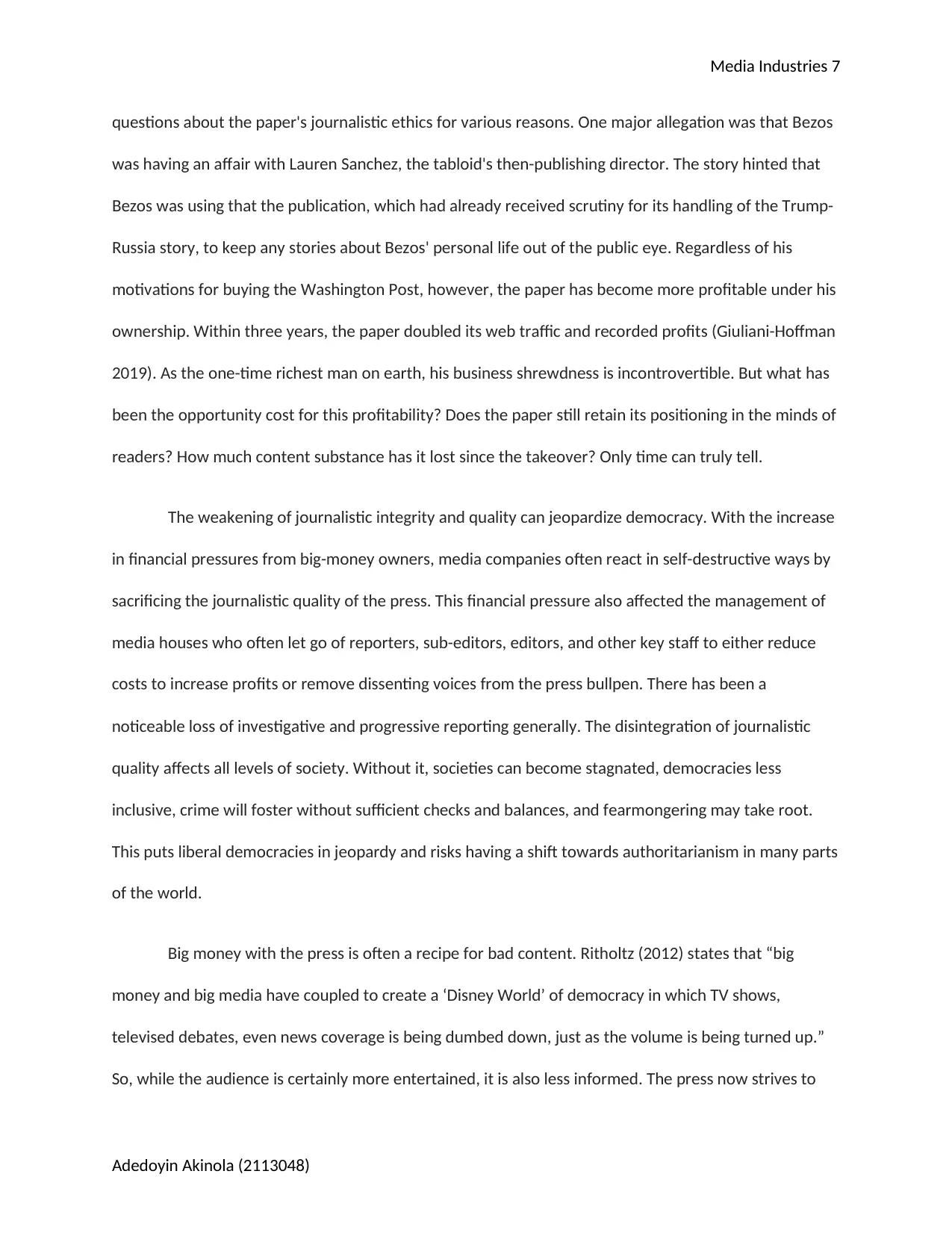
Media Industries 7
Adedoyin Akinola (2113048)
questions about the paper's journalistic ethics for various reasons. One major allegation was that Bezos
was having an affair with Lauren Sanchez, the tabloid's then-publishing director. The story hinted that
Bezos was using that the publication, which had already received scrutiny for its handling of the Trump-
Russia story, to keep any stories about Bezos' personal life out of the public eye. Regardless of his
motivations for buying the Washington Post, however, the paper has become more profitable under his
ownership. Within three years, the paper doubled its web traffic and recorded profits (Giuliani-Hoffman
2019). As the one-time richest man on earth, his business shrewdness is incontrovertible. But what has
been the opportunity cost for this profitability? Does the paper still retain its positioning in the minds of
readers? How much content substance has it lost since the takeover? Only time can truly tell.
The weakening of journalistic integrity and quality can jeopardize democracy. With the increase
in financial pressures from big-money owners, media companies often react in self-destructive ways by
sacrificing the journalistic quality of the press. This financial pressure also affected the management of
media houses who often let go of reporters, sub-editors, editors, and other key staff to either reduce
costs to increase profits or remove dissenting voices from the press bullpen. There has been a
noticeable loss of investigative and progressive reporting generally. The disintegration of journalistic
quality affects all levels of society. Without it, societies can become stagnated, democracies less
inclusive, crime will foster without sufficient checks and balances, and fearmongering may take root.
This puts liberal democracies in jeopardy and risks having a shift towards authoritarianism in many parts
of the world.
Big money with the press is often a recipe for bad content. Ritholtz (2012) states that “big
money and big media have coupled to create a ‘Disney World’ of democracy in which TV shows,
televised debates, even news coverage is being dumbed down, just as the volume is being turned up.”
So, while the audience is certainly more entertained, it is also less informed. The press now strives to
Adedoyin Akinola (2113048)
questions about the paper's journalistic ethics for various reasons. One major allegation was that Bezos
was having an affair with Lauren Sanchez, the tabloid's then-publishing director. The story hinted that
Bezos was using that the publication, which had already received scrutiny for its handling of the Trump-
Russia story, to keep any stories about Bezos' personal life out of the public eye. Regardless of his
motivations for buying the Washington Post, however, the paper has become more profitable under his
ownership. Within three years, the paper doubled its web traffic and recorded profits (Giuliani-Hoffman
2019). As the one-time richest man on earth, his business shrewdness is incontrovertible. But what has
been the opportunity cost for this profitability? Does the paper still retain its positioning in the minds of
readers? How much content substance has it lost since the takeover? Only time can truly tell.
The weakening of journalistic integrity and quality can jeopardize democracy. With the increase
in financial pressures from big-money owners, media companies often react in self-destructive ways by
sacrificing the journalistic quality of the press. This financial pressure also affected the management of
media houses who often let go of reporters, sub-editors, editors, and other key staff to either reduce
costs to increase profits or remove dissenting voices from the press bullpen. There has been a
noticeable loss of investigative and progressive reporting generally. The disintegration of journalistic
quality affects all levels of society. Without it, societies can become stagnated, democracies less
inclusive, crime will foster without sufficient checks and balances, and fearmongering may take root.
This puts liberal democracies in jeopardy and risks having a shift towards authoritarianism in many parts
of the world.
Big money with the press is often a recipe for bad content. Ritholtz (2012) states that “big
money and big media have coupled to create a ‘Disney World’ of democracy in which TV shows,
televised debates, even news coverage is being dumbed down, just as the volume is being turned up.”
So, while the audience is certainly more entertained, it is also less informed. The press now strives to
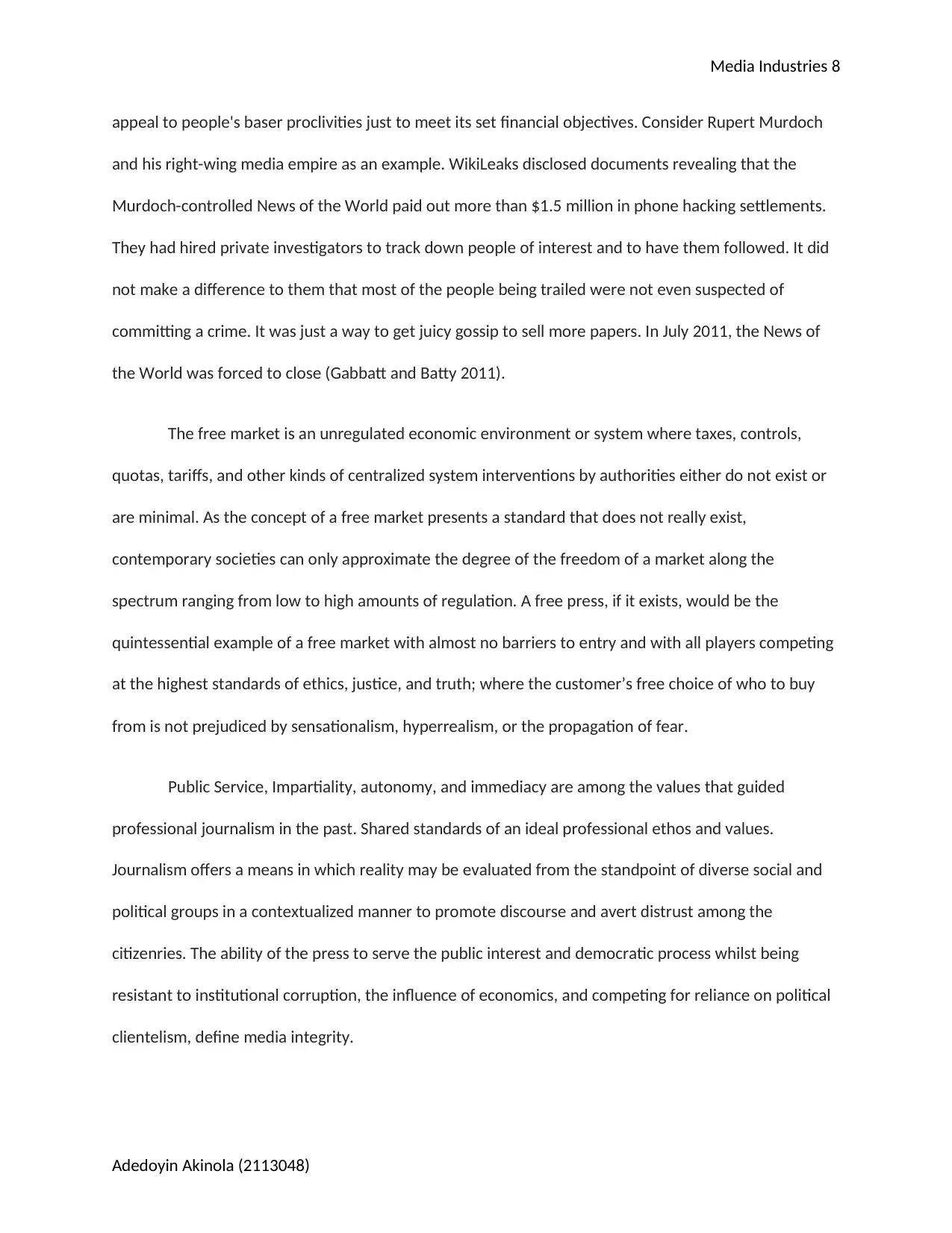
Media Industries 8
Adedoyin Akinola (2113048)
appeal to people's baser proclivities just to meet its set financial objectives. Consider Rupert Murdoch
and his right-wing media empire as an example. WikiLeaks disclosed documents revealing that the
Murdoch-controlled News of the World paid out more than $1.5 million in phone hacking settlements.
They had hired private investigators to track down people of interest and to have them followed. It did
not make a difference to them that most of the people being trailed were not even suspected of
committing a crime. It was just a way to get juicy gossip to sell more papers. In July 2011, the News of
the World was forced to close (Gabbatt and Batty 2011).
The free market is an unregulated economic environment or system where taxes, controls,
quotas, tariffs, and other kinds of centralized system interventions by authorities either do not exist or
are minimal. As the concept of a free market presents a standard that does not really exist,
contemporary societies can only approximate the degree of the freedom of a market along the
spectrum ranging from low to high amounts of regulation. A free press, if it exists, would be the
quintessential example of a free market with almost no barriers to entry and with all players competing
at the highest standards of ethics, justice, and truth; where the customer’s free choice of who to buy
from is not prejudiced by sensationalism, hyperrealism, or the propagation of fear.
Public Service, Impartiality, autonomy, and immediacy are among the values that guided
professional journalism in the past. Shared standards of an ideal professional ethos and values.
Journalism offers a means in which reality may be evaluated from the standpoint of diverse social and
political groups in a contextualized manner to promote discourse and avert distrust among the
citizenries. The ability of the press to serve the public interest and democratic process whilst being
resistant to institutional corruption, the influence of economics, and competing for reliance on political
clientelism, define media integrity.
Adedoyin Akinola (2113048)
appeal to people's baser proclivities just to meet its set financial objectives. Consider Rupert Murdoch
and his right-wing media empire as an example. WikiLeaks disclosed documents revealing that the
Murdoch-controlled News of the World paid out more than $1.5 million in phone hacking settlements.
They had hired private investigators to track down people of interest and to have them followed. It did
not make a difference to them that most of the people being trailed were not even suspected of
committing a crime. It was just a way to get juicy gossip to sell more papers. In July 2011, the News of
the World was forced to close (Gabbatt and Batty 2011).
The free market is an unregulated economic environment or system where taxes, controls,
quotas, tariffs, and other kinds of centralized system interventions by authorities either do not exist or
are minimal. As the concept of a free market presents a standard that does not really exist,
contemporary societies can only approximate the degree of the freedom of a market along the
spectrum ranging from low to high amounts of regulation. A free press, if it exists, would be the
quintessential example of a free market with almost no barriers to entry and with all players competing
at the highest standards of ethics, justice, and truth; where the customer’s free choice of who to buy
from is not prejudiced by sensationalism, hyperrealism, or the propagation of fear.
Public Service, Impartiality, autonomy, and immediacy are among the values that guided
professional journalism in the past. Shared standards of an ideal professional ethos and values.
Journalism offers a means in which reality may be evaluated from the standpoint of diverse social and
political groups in a contextualized manner to promote discourse and avert distrust among the
citizenries. The ability of the press to serve the public interest and democratic process whilst being
resistant to institutional corruption, the influence of economics, and competing for reliance on political
clientelism, define media integrity.
⊘ This is a preview!⊘
Do you want full access?
Subscribe today to unlock all pages.

Trusted by 1+ million students worldwide
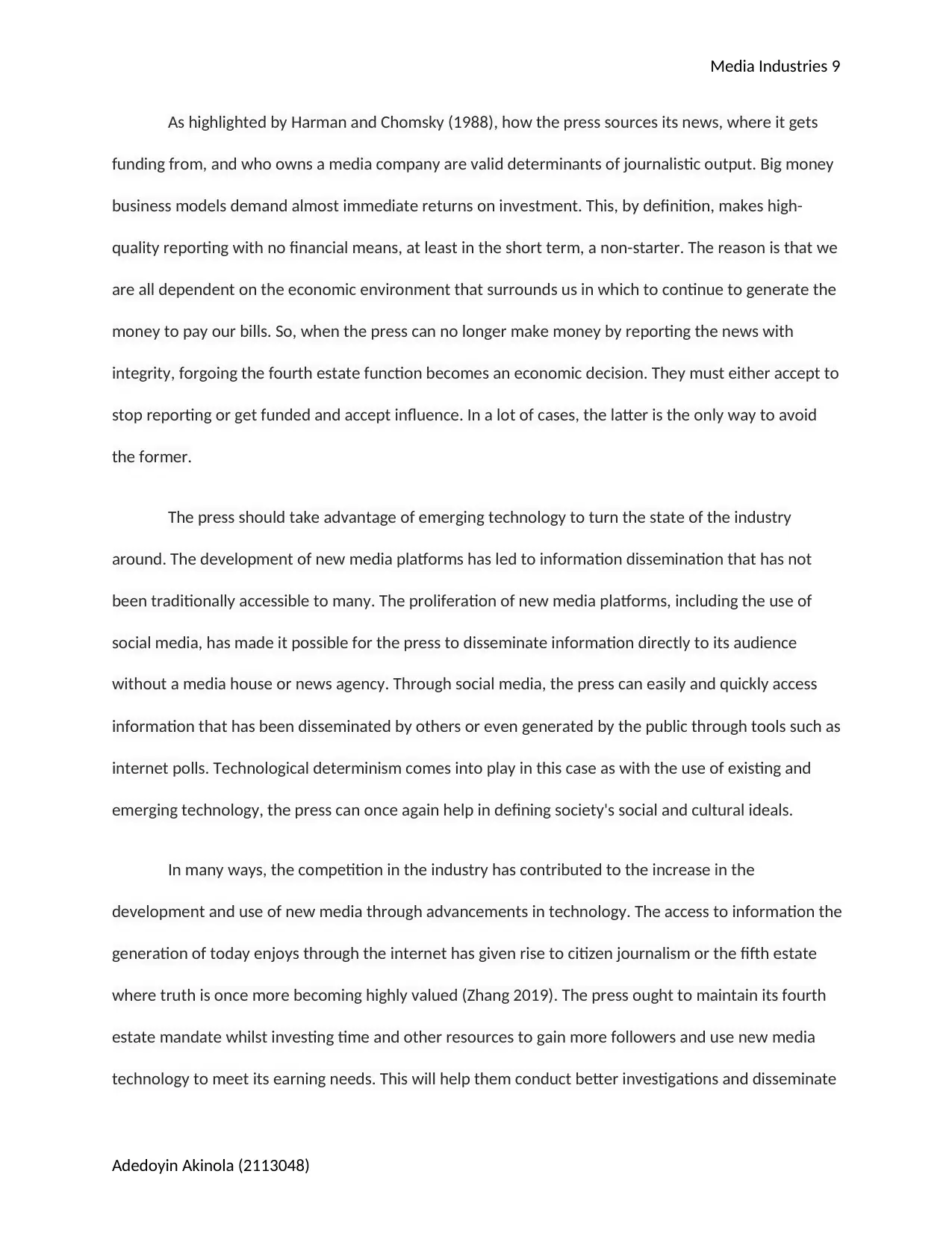
Media Industries 9
Adedoyin Akinola (2113048)
As highlighted by Harman and Chomsky (1988), how the press sources its news, where it gets
funding from, and who owns a media company are valid determinants of journalistic output. Big money
business models demand almost immediate returns on investment. This, by definition, makes high-
quality reporting with no financial means, at least in the short term, a non-starter. The reason is that we
are all dependent on the economic environment that surrounds us in which to continue to generate the
money to pay our bills. So, when the press can no longer make money by reporting the news with
integrity, forgoing the fourth estate function becomes an economic decision. They must either accept to
stop reporting or get funded and accept influence. In a lot of cases, the latter is the only way to avoid
the former.
The press should take advantage of emerging technology to turn the state of the industry
around. The development of new media platforms has led to information dissemination that has not
been traditionally accessible to many. The proliferation of new media platforms, including the use of
social media, has made it possible for the press to disseminate information directly to its audience
without a media house or news agency. Through social media, the press can easily and quickly access
information that has been disseminated by others or even generated by the public through tools such as
internet polls. Technological determinism comes into play in this case as with the use of existing and
emerging technology, the press can once again help in defining society's social and cultural ideals.
In many ways, the competition in the industry has contributed to the increase in the
development and use of new media through advancements in technology. The access to information the
generation of today enjoys through the internet has given rise to citizen journalism or the fifth estate
where truth is once more becoming highly valued (Zhang 2019). The press ought to maintain its fourth
estate mandate whilst investing time and other resources to gain more followers and use new media
technology to meet its earning needs. This will help them conduct better investigations and disseminate
Adedoyin Akinola (2113048)
As highlighted by Harman and Chomsky (1988), how the press sources its news, where it gets
funding from, and who owns a media company are valid determinants of journalistic output. Big money
business models demand almost immediate returns on investment. This, by definition, makes high-
quality reporting with no financial means, at least in the short term, a non-starter. The reason is that we
are all dependent on the economic environment that surrounds us in which to continue to generate the
money to pay our bills. So, when the press can no longer make money by reporting the news with
integrity, forgoing the fourth estate function becomes an economic decision. They must either accept to
stop reporting or get funded and accept influence. In a lot of cases, the latter is the only way to avoid
the former.
The press should take advantage of emerging technology to turn the state of the industry
around. The development of new media platforms has led to information dissemination that has not
been traditionally accessible to many. The proliferation of new media platforms, including the use of
social media, has made it possible for the press to disseminate information directly to its audience
without a media house or news agency. Through social media, the press can easily and quickly access
information that has been disseminated by others or even generated by the public through tools such as
internet polls. Technological determinism comes into play in this case as with the use of existing and
emerging technology, the press can once again help in defining society's social and cultural ideals.
In many ways, the competition in the industry has contributed to the increase in the
development and use of new media through advancements in technology. The access to information the
generation of today enjoys through the internet has given rise to citizen journalism or the fifth estate
where truth is once more becoming highly valued (Zhang 2019). The press ought to maintain its fourth
estate mandate whilst investing time and other resources to gain more followers and use new media
technology to meet its earning needs. This will help them conduct better investigations and disseminate
Paraphrase This Document
Need a fresh take? Get an instant paraphrase of this document with our AI Paraphraser
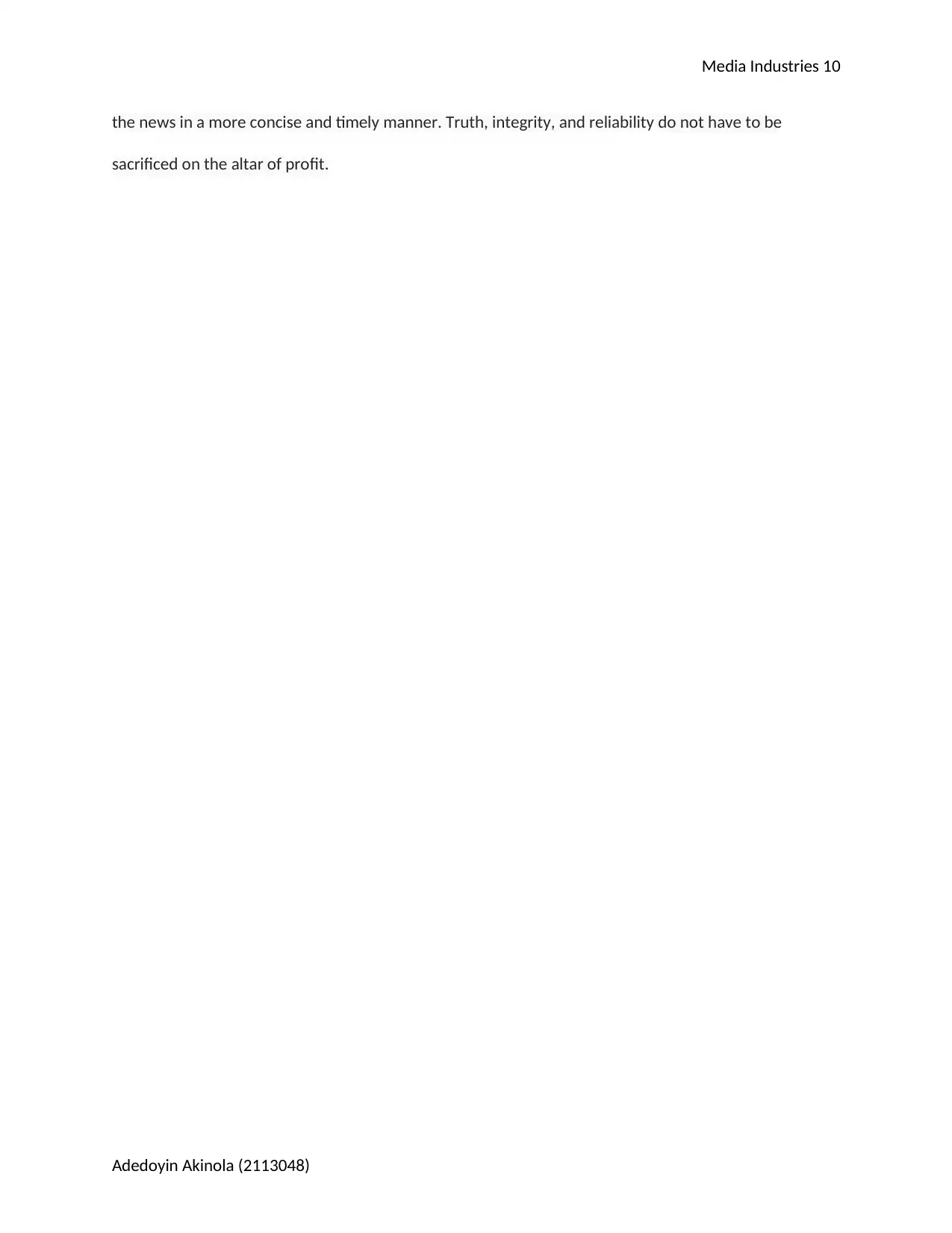
Media Industries 10
Adedoyin Akinola (2113048)
the news in a more concise and timely manner. Truth, integrity, and reliability do not have to be
sacrificed on the altar of profit.
Adedoyin Akinola (2113048)
the news in a more concise and timely manner. Truth, integrity, and reliability do not have to be
sacrificed on the altar of profit.
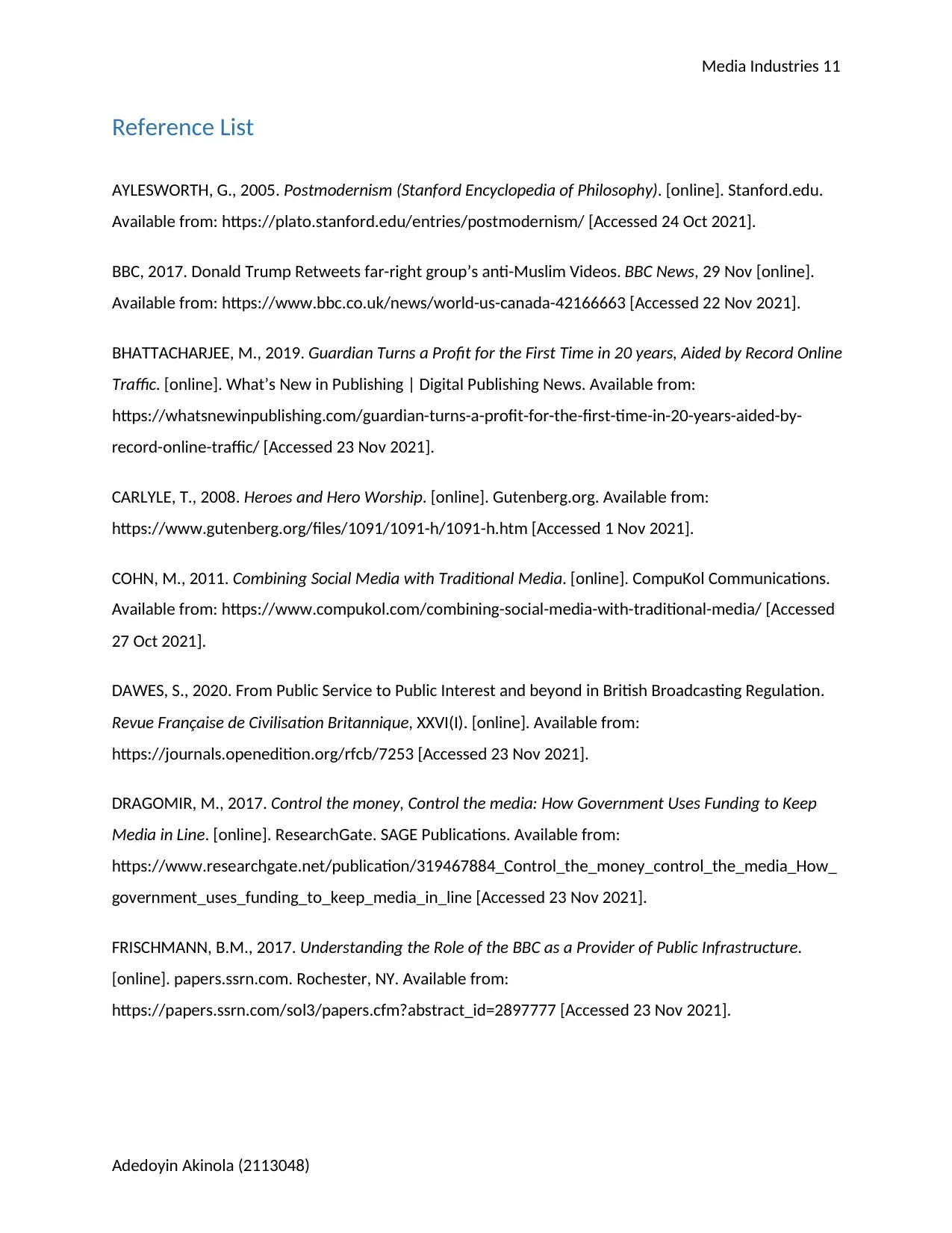
Media Industries 11
Adedoyin Akinola (2113048)
Reference List
AYLESWORTH, G., 2005. Postmodernism (Stanford Encyclopedia of Philosophy). [online]. Stanford.edu.
Available from: https://plato.stanford.edu/entries/postmodernism/ [Accessed 24 Oct 2021].
BBC, 2017. Donald Trump Retweets far-right group’s anti-Muslim Videos. BBC News, 29 Nov [online].
Available from: https://www.bbc.co.uk/news/world-us-canada-42166663 [Accessed 22 Nov 2021].
BHATTACHARJEE, M., 2019. Guardian Turns a Profit for the First Time in 20 years, Aided by Record Online
Traffic. [online]. What’s New in Publishing | Digital Publishing News. Available from:
https://whatsnewinpublishing.com/guardian-turns-a-profit-for-the-first-time-in-20-years-aided-by-
record-online-traffic/ [Accessed 23 Nov 2021].
CARLYLE, T., 2008. Heroes and Hero Worship. [online]. Gutenberg.org. Available from:
https://www.gutenberg.org/files/1091/1091-h/1091-h.htm [Accessed 1 Nov 2021].
COHN, M., 2011. Combining Social Media with Traditional Media. [online]. CompuKol Communications.
Available from: https://www.compukol.com/combining-social-media-with-traditional-media/ [Accessed
27 Oct 2021].
DAWES, S., 2020. From Public Service to Public Interest and beyond in British Broadcasting Regulation.
Revue Française de Civilisation Britannique, XXVI(I). [online]. Available from:
https://journals.openedition.org/rfcb/7253 [Accessed 23 Nov 2021].
DRAGOMIR, M., 2017. Control the money, Control the media: How Government Uses Funding to Keep
Media in Line. [online]. ResearchGate. SAGE Publications. Available from:
https://www.researchgate.net/publication/319467884_Control_the_money_control_the_media_How_
government_uses_funding_to_keep_media_in_line [Accessed 23 Nov 2021].
FRISCHMANN, B.M., 2017. Understanding the Role of the BBC as a Provider of Public Infrastructure.
[online]. papers.ssrn.com. Rochester, NY. Available from:
https://papers.ssrn.com/sol3/papers.cfm?abstract_id=2897777 [Accessed 23 Nov 2021].
Adedoyin Akinola (2113048)
Reference List
AYLESWORTH, G., 2005. Postmodernism (Stanford Encyclopedia of Philosophy). [online]. Stanford.edu.
Available from: https://plato.stanford.edu/entries/postmodernism/ [Accessed 24 Oct 2021].
BBC, 2017. Donald Trump Retweets far-right group’s anti-Muslim Videos. BBC News, 29 Nov [online].
Available from: https://www.bbc.co.uk/news/world-us-canada-42166663 [Accessed 22 Nov 2021].
BHATTACHARJEE, M., 2019. Guardian Turns a Profit for the First Time in 20 years, Aided by Record Online
Traffic. [online]. What’s New in Publishing | Digital Publishing News. Available from:
https://whatsnewinpublishing.com/guardian-turns-a-profit-for-the-first-time-in-20-years-aided-by-
record-online-traffic/ [Accessed 23 Nov 2021].
CARLYLE, T., 2008. Heroes and Hero Worship. [online]. Gutenberg.org. Available from:
https://www.gutenberg.org/files/1091/1091-h/1091-h.htm [Accessed 1 Nov 2021].
COHN, M., 2011. Combining Social Media with Traditional Media. [online]. CompuKol Communications.
Available from: https://www.compukol.com/combining-social-media-with-traditional-media/ [Accessed
27 Oct 2021].
DAWES, S., 2020. From Public Service to Public Interest and beyond in British Broadcasting Regulation.
Revue Française de Civilisation Britannique, XXVI(I). [online]. Available from:
https://journals.openedition.org/rfcb/7253 [Accessed 23 Nov 2021].
DRAGOMIR, M., 2017. Control the money, Control the media: How Government Uses Funding to Keep
Media in Line. [online]. ResearchGate. SAGE Publications. Available from:
https://www.researchgate.net/publication/319467884_Control_the_money_control_the_media_How_
government_uses_funding_to_keep_media_in_line [Accessed 23 Nov 2021].
FRISCHMANN, B.M., 2017. Understanding the Role of the BBC as a Provider of Public Infrastructure.
[online]. papers.ssrn.com. Rochester, NY. Available from:
https://papers.ssrn.com/sol3/papers.cfm?abstract_id=2897777 [Accessed 23 Nov 2021].
⊘ This is a preview!⊘
Do you want full access?
Subscribe today to unlock all pages.

Trusted by 1+ million students worldwide
1 out of 14
Your All-in-One AI-Powered Toolkit for Academic Success.
+13062052269
info@desklib.com
Available 24*7 on WhatsApp / Email
![[object Object]](/_next/static/media/star-bottom.7253800d.svg)
Unlock your academic potential
Copyright © 2020–2025 A2Z Services. All Rights Reserved. Developed and managed by ZUCOL.